|
|
|
Sort Order |
|
|
|
Items / Page
|
|
|
|
|
|
|
| Srl | Item |
| 1 |
ID:
142569
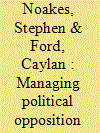

|
|
|
|
|
| Summary/Abstract |
In this article, we seek to explain the persistence of the Communist Party's campaign to suppress the Falun Gong religious movement. We argue that the unrecoverable investment of more than a decade's worth of suppression work, compounded by the ineffectiveness of these efforts (as evinced in official documents and by the continuation of resistance activities), limits the state's ability to halt its campaign against Falun Gong. Our findings shed light on some of the Chinese state's current strategies for the management and control of domestic opposition groups, and challenge the view of the Party as adaptable and highly capable of reform from within.
|
|
|
|
|
|
|
|
|
|
|
|
|
|
|
|
| 2 |
ID:
142572
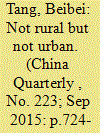

|
|
|
|
|
| Summary/Abstract |
China's urbanization has created a large number of urban villages which, although they have been transferred to urban administration, have maintained their collective economies. Using a comparative perspective, this article investigates how villagers, the village collectives and the urban administration organize community governance in three urban villages on the fringes of the cities of Guangzhou, Wuhan and Shenyang. The findings suggest that successful village collective shareholding companies play a leading role in community governance by providing villagers with economic and social welfare, subsidizing community administration services, and mobilizing residents. The comparative analysis also shows that village shareholding companies employ different mechanisms based on the varied histories of their village collective economies, the ability of the village collectives to mobilize resources, and the degree to which the village collectives are engaged in the grassroots administrative structure. The article argues that the “not rural but not urban” governance mode of the urban villages illustrates China's fragmented urbanization planning. At the same time, it illuminates the dynamics of state–society relations during China's urbanization and how landless villagers and village collectives respond to urban transformation by adopting different strategies to preserve their individual and collective interests.
|
|
|
|
|
|
|
|
|
|
|
|
|
|
|
|
| 3 |
ID:
142567


|
|
|
|
|
| Summary/Abstract |
The implementation of China's reform era target-based cadre evaluation system has instigated various types of gaming behaviour on the part of local officials. How do these gaming strategies differ from each other? Why do local officials sacrifice the public interest for target fulfilment in some cases but not in others? This article argues that gaming is not monolithic and should not be treated as such. It develops a typology that distinguishes between pernicious and benign gaming, and looks into the symptoms and motives of pernicious gaming in particular. It finds that the distinct design of the measurement system – the combination of result-oriented targets imposed from above and high-powered incentives for target fulfilment – induces pernicious gaming. In addition, the system's implementation practically compels local officials to misrepresent their performance, even though they are aware of the negative impact of such behaviour on the public interest. This study shows that to understand the strategies, motivations and implications of gaming better, a more nuanced approach is needed.
|
|
|
|
|
|
|
|
|
|
|
|
|
|
|
|
| 4 |
ID:
142570
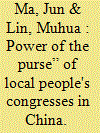

|
|
|
|
|
| Summary/Abstract |
Since the 1999 budget reform, and for the first time in China, local people's congresses (LPCs) have begun to exert “the power of the purse.” Based on our fieldwork and survey, we argue that while LPCs have strengthened their budgetary oversight since the reform, they continue to employ a strategy of “embeddedness.” Although certain LPCs have become more contentious, they tend to veil contestations in bureaucratic negotiation in order to avoid uncontrollable budgetary conflicts. The strategy adopted by LPCs in budgetary oversight provides a case for examining the recent debate over the behaviour patterns of LPCs in legislative oversight.
|
|
|
|
|
|
|
|
|
|
|
|
|
|
|
|
| 5 |
ID:
142574
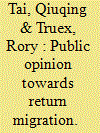

|
|
|
|
|
| Summary/Abstract |
China has adopted preferential measures in hopes of luring back overseas talent, but what determines individual attitudes towards returning migrants and policies promoting return migration? This paper addresses this question using an original survey experiment of Chinese netizens. We argue that attitudes towards return migration are driven by two competing perceptions: on one hand, skilled migrants are widely thought to have beneficial effects on the local economy; on the other, domestic citizens may be wary of policies that offer elite returnees excessive benefits. The findings imply that the CCP may face a delicate trade-off between the economic benefits of return migration and the social costs of increasing inequality.
|
|
|
|
|
|
|
|
|
|
|
|
|
|
|
|
| 6 |
ID:
142566
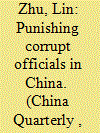

|
|
|
|
|
| Summary/Abstract |
China presents a mixed picture in terms of its anti-corruption efforts. On the one hand, rampant corruption remains a huge challenge for the party-state because it not only results in the loss of state assets but also damages the legitimacy of the regime. On the other hand, China's record of curbing corruption is not particularly worse than other comparable countries. This paper explains the reasons behind this mixed picture by focusing on the anti-corruption strategy employed by the central Party authorities. Effective anti-corruption measures are determined by the high probability of detecting corrupt agents and the meting out of effective and warranted punishment. In China, the central government is unable or unwilling to investigate a large number of officials, especially high-ranking officials. However, at the same time, it must impose severe punishment on convicted high-ranking officials. Although this mode of selective discipline compromises the credibility of the state in terms of anti-corruption efficacy, it also creates uncertainty for corrupt agents because corrupt officials are not guaranteed exemption.
|
|
|
|
|
|
|
|
|
|
|
|
|
|
|
|
| 7 |
ID:
142571


|
|
|
|
|
| Summary/Abstract |
Relations between the state and labour NGOs in China have been particularly fraught. In 2012, they took an interesting turn when some local governments made overtures to labour NGOs to cooperate in providing services to migrant workers. This article argues that this shift is part of a broader strategy of “welfarist incorporation” to redraw the social contract between state and labour. There are two key elements to this strategy: first, a relaxation of the registration regulations for social organizations, and second, governmental purchasing of services from social organizations. These overtures have both a state and market logic to maintain social control and stabilize relations of production.
|
|
|
|
|
|
|
|
|
|
|
|
|
|
|
|
| 8 |
ID:
142568
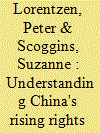

|
|
|
|
|
| Summary/Abstract |
Claims that China's people are exhibiting a rising “rights consciousness” have become commonplace, with some suggesting this phenomenon is driving political change. Yet it is often unclear what the concept means, leading to ambiguous or contradictory conclusions from field research. In order to create a basis for more systematic analysis, we develop a rational choice framework that characterizes three different factors that could lead to rights-conscious behaviour: changing values, changing government policies, and changing expectations of the behaviour of others. What rising rights consciousness implies for social stability can vary dramatically, depending on which change is at work. Rights consciousness resulting from changes in values or in shared expectations of behaviour is destabilizing for the CCP's continued rule, whereas rights consciousness derived from government policies has a stabilizing effect. While in practice these can be interrelated in complex ways, empirical research would benefit from greater attention to these distinctions.
|
|
|
|
|
|
|
|
|
|
|
|
|
|
|
|
| 9 |
ID:
142575


|
|
|
|
|
| Summary/Abstract |
The Chinese Communist Party (CCP) government engages in a vast range of measures aimed at moulding global and domestic public opinion on the Taiwan issue. The Taiwan frames set by the CCP are not just aimed at shaping domestic Chinese public opinion and global discourse on Taiwan-related matters; they also succeed in curtailing the Republic of China (ROC) on Taiwan's global political and commercial space. The CCP's Taiwan frames are in direct conflict with the evolving “Taiwanese identity” frames coming out of the ROC. Moreover, they form part of the CCP government's wider ideological project to frame global concepts of “Chineseness,” which is aimed at combating other ideological challenges to that trope such as the Falun Gong movement, Tibetan independence activism and Chinese democracy groups. Yet, political, economic and technological changes in the PRC and globally suggest that, despite the CCP government's increased efforts, it may be harder than ever to ensure that the CCP frames have the desired effect.
|
|
|
|
|
|
|
|
|
|
|
|
|
|
|
|
| 10 |
ID:
142573
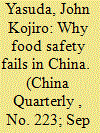

|
|
|
|
|
| Summary/Abstract |
This article examines food safety failures in China to cast light on how scale has deeply affected its regulatory politics. Contrary to studies that view China's food safety challenges as primarily resulting from corruption, local obstructionism or weak state capacity, I argue that China's massive production system, unwieldy bureaucracy, and geographic size pose regulators with a more fundamental policy challenge. As they attempt to build an integrated national regulatory regime, regulators must make difficult trade-offs in cost, policy design and applicability that emphasize the interests of certain stakeholders over others, resulting in a contentious “politics of scale.” The article assesses four failed scale management initiatives: food safety coordination bodies, campaigns, model production zones, and regulatory segmentation. As China transitions to scientifically assessed, risk-based forms of regulation, its pervasive food safety problem suggests the adaptive limits of China's unitary regulatory structure to manage scale and its ensuing politics effectively in a complex multilevel context.
|
|
|
|
|
|
|
|
|
|
|
|
|
|
|
|
|
|
|
|
|